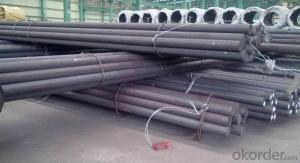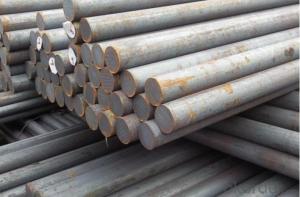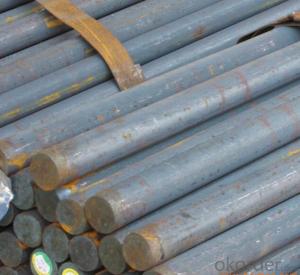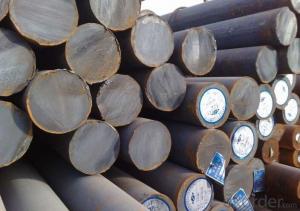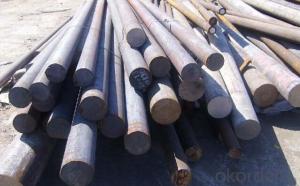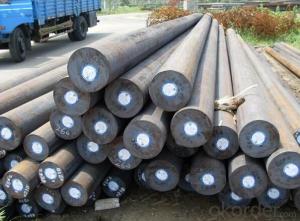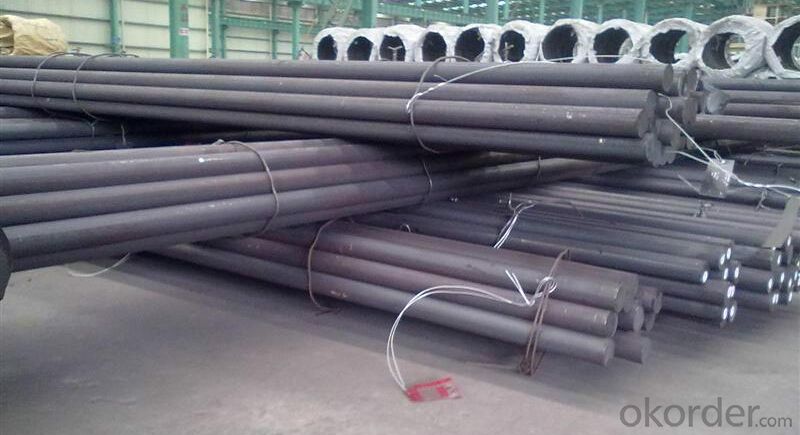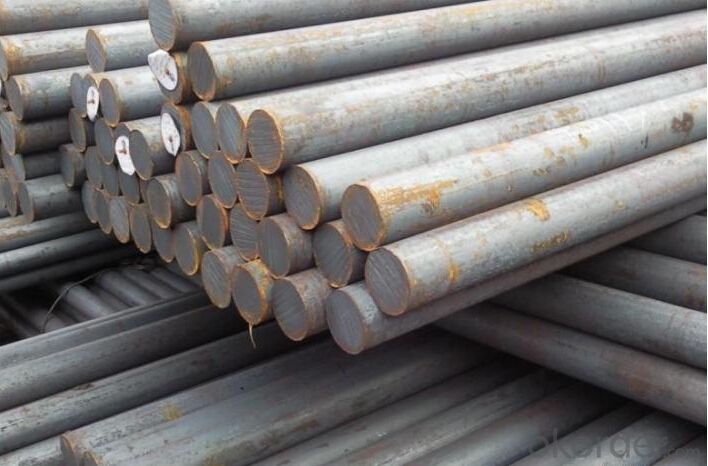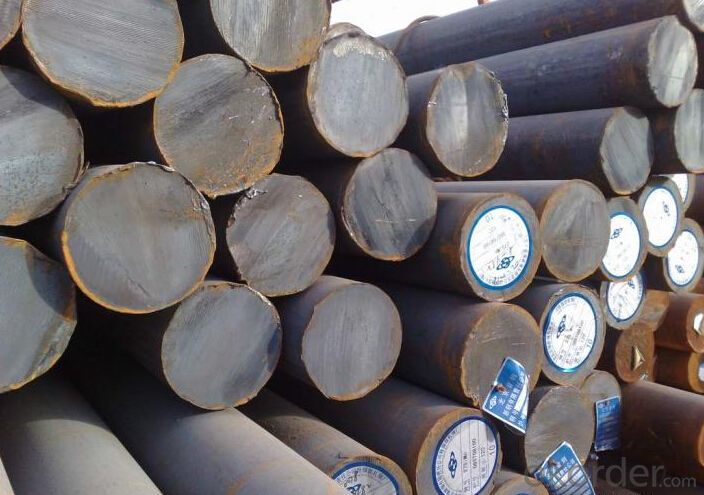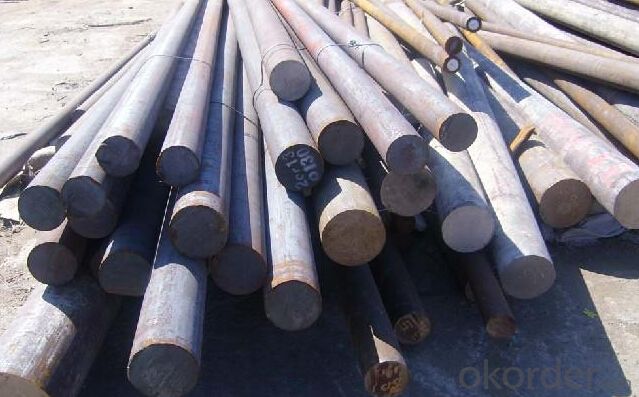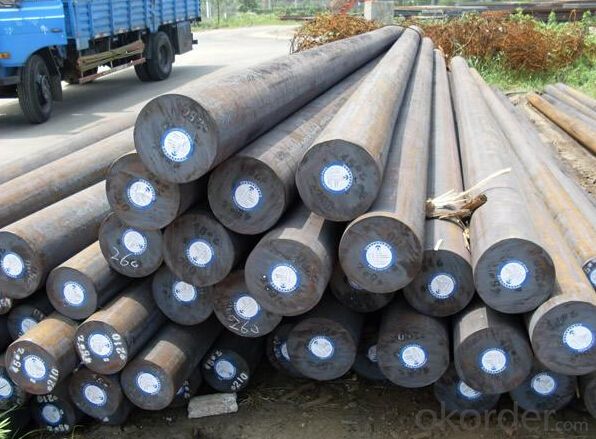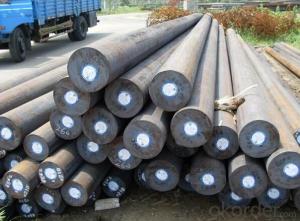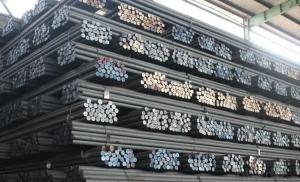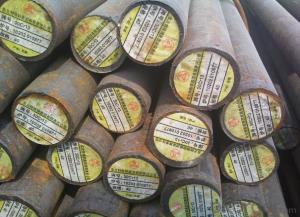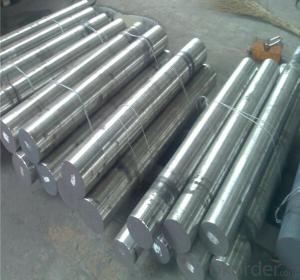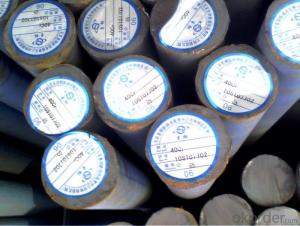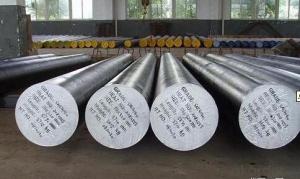Grade DIN 20Cr4 CNBM Alloy Steel Round Bar Made in China
- Loading Port:
- Shanghai
- Payment Terms:
- TT OR LC
- Min Order Qty:
- 3 m.t.
- Supply Capability:
- 10000 m.t./month
OKorder Service Pledge
OKorder Financial Service
You Might Also Like
Specification
Product Description
1. Diameter: 8mm-250mm rou
2. Length: 2m, 3m, 5.8m, 6m or customized
3. Standard: GB, ASTM, AISI, SAE, DIN, JIS, EN
4. Produce Process: smelt iron - EAF smelt billet - ESR smelt billet -hot rolled or forged -steel round bar and plate
5. Heat Treatment: annealing, normalizing, tempering, quenching
6. Surface Treatment: Black, Polished, Galvanized
7. Quality Assurance: We accept third party inspection for all orders.
You can ask testing organizations such as SGS, BV, etc. to test our products before shipping.
Chemical Composition
Grade | Dia.(mm) | C | Si | Mn | Cr | P | S | Ni | Cu |
5120 | 16-85 | 0.18-0.24 | 0.17-0.37 | 0.50-0.80 | 0.70-1.00 | ≤0.035 | ≤0.035 | ≤0.03 | ≤0.03 |
5140 | 16-400 | 0.37-0.44 | 0.17-0.37 | 0.50-0.80 | 0.80-1.10 | ≤0.035 | ≤0.035 | ≤0.30 | ≤0.03 |
4135 | 13-230 | 0.32-0.40 | 0.17-0.37 | 0.40-0.70 | 0.80-1.10 | ≤0.035 | ≤0.035 | ≤0.03 | ≤0.03 |
4140 | 13-360 | 0.38-0.45 | 0.17-0.37 | 0.50-0.80 | 0.90-1.20 | ≤0.035 | ≤0.035 | ≤0.03 | ≤0.03 |
Application:
Mechanism & Fasteners gear,
Stressed components for vehicles
Engines and machines
Parts of larger cross-section
Company Information:
CNBM International Corporation is the most important trading platform of CNBM group.
Whith its advantages, CNBM International are mainly concentrate on Cement, Glass, Iron and Steel, Ceramics industries and devotes herself for supplying high qulity series of refractories as well as technical consultancies and logistics solutions.
Packing & Delivery
1. Packaging: seaworthy package or as required
2. Delivery: 35-45 days or based on quantity
Product Show
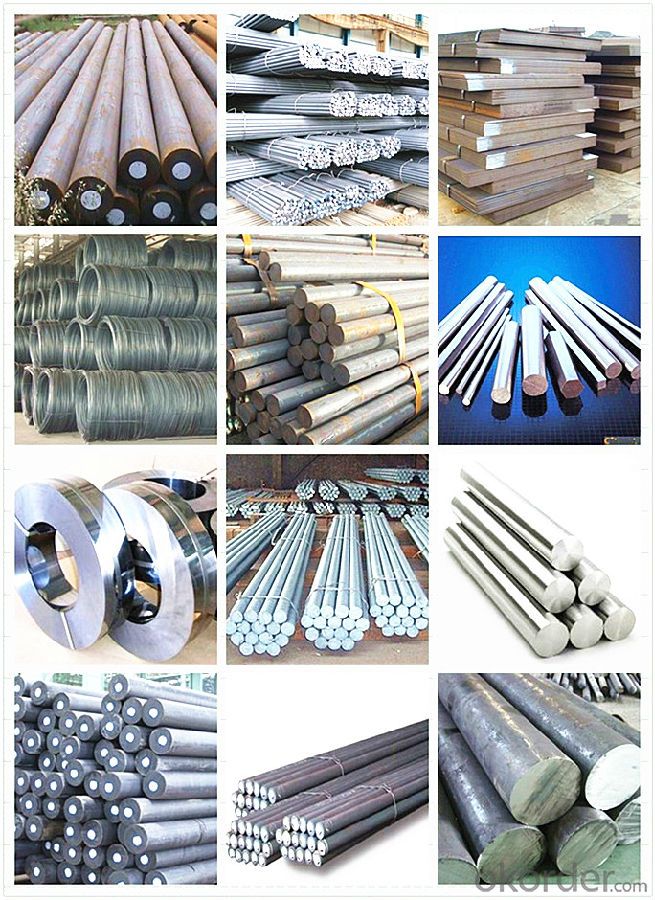
FAQ:
1.Your advantages?
Professional products inquiry, products knowledge train (for agents), smooth goods delivery, excellent
customer solution proposale
2. Test & Certificate?
SGS test is available, customer inspection before shipping is welcome, third party inspection is no problem
3. Factory or Trading Company?
CNBM is a trading company but we have so many protocol factories and CNBM works as a trading department
of these factories. Also CNBM is the holding company of many factories.
4. Payment Terms?
30% TT as deposit and 70% before delivery.
Irrevocable L/C at sight.
5. Trading Terms?
EXW, FOB, CIF, FFR, CNF
6. After-sale Service?
CNBM provides the services and support you need for every step of our cooperation. We're the business
partner you can trust.
For any problem, please kindly contact us at any your convenient time.
We'll reply you in our first priority within 24 hours.
- Q: How does special steel contribute to the strength of products?
- Special steel contributes to the strength of products through its unique composition and manufacturing process. By incorporating specific alloys and heat treatments, special steel enhances the material's durability, toughness, and resistance to wear and corrosion. This increased strength allows products made from special steel to withstand higher loads, pressures, and extreme conditions, making them more reliable and long-lasting.
- Q: What are the different surface treatment methods used for special steel?
- There are several different surface treatment methods used for special steel, including but not limited to electroplating, galvanizing, powder coating, and heat treatment. These methods help to enhance the corrosion resistance, improve the appearance, and increase the durability of special steel products.
- Q: What are the safety measures taken during the production of special steel?
- During the production of special steel, several safety measures are taken to ensure the wellbeing of workers and to minimize potential hazards. These safety measures include: 1. Personal Protective Equipment (PPE): All workers involved in the production of special steel are required to wear appropriate PPE, such as safety helmets, goggles, gloves, and protective clothing. This helps protect them from potential injuries, burns, or exposure to hazardous materials. 2. Training and Education: Workers undergo thorough training and education on safe working practices and procedures. They learn about the potential hazards associated with the production of special steel and are trained on how to handle equipment and materials safely. 3. Risk Assessments: Regular risk assessments are conducted to identify potential hazards and assess the level of risk associated with each task. This allows for the implementation of control measures to mitigate risks and prevent accidents. 4. Machinery and Equipment Safety: All machinery and equipment used in the production process are properly maintained and regularly inspected to ensure they are in good working condition. Safety features, such as emergency stop buttons and guards, are in place to prevent accidents and injuries. 5. Ventilation and Exhaust Systems: Special steel production often involves high temperatures and the use of chemicals that may release harmful fumes or gases. Proper ventilation and exhaust systems are installed to remove these pollutants from the work environment, ensuring a safe and healthy atmosphere for workers. 6. Fire Prevention: Fire prevention measures, such as the installation of fire alarms, extinguishers, and sprinkler systems, are implemented to minimize the risk of fire accidents. Workers are also trained on fire safety protocols and evacuation procedures. 7. Emergency Response Plans: Comprehensive emergency response plans are developed and communicated to all workers. These plans outline procedures to be followed in case of accidents, fires, or other emergencies, ensuring a prompt and organized response. 8. Regular Safety Inspections: Regular inspections are conducted by safety professionals to identify any potential safety hazards or non-compliance with safety protocols. Any issues or deficiencies are promptly addressed to maintain a safe working environment. By implementing these safety measures, the production of special steel can be carried out in a controlled and safe manner, protecting the workers and minimizing the risk of accidents or injuries.
- Q: How does special steel contribute to the manufacturing of fasteners?
- Special steel contributes to the manufacturing of fasteners by providing higher strength, durability, and corrosion resistance compared to regular steel. This allows fasteners to withstand heavy loads, vibrations, and harsh environmental conditions, ensuring their longevity and reliability in various applications. Additionally, special steel can be tailored to specific requirements, enabling the production of fasteners with precise dimensions, shapes, and surface finishes, thereby enhancing their performance and compatibility with different components and structures.
- Q: How does special steel contribute to the manufacturing of structural components?
- Special steel plays a crucial role in the manufacturing of structural components due to its unique properties and characteristics. Firstly, special steel offers exceptional strength and durability, making it an ideal material for constructing load-bearing structures. It can withstand high levels of stress, pressure, and heavy loads, ensuring the structural integrity and safety of the components. Furthermore, special steel possesses excellent corrosion resistance, which is particularly important for structural components exposed to harsh environments, such as bridges, offshore platforms, or buildings near the coast. This corrosion resistance helps prevent rusting and deterioration, prolonging the lifespan of the structural components and reducing maintenance costs. Moreover, special steel offers a high degree of versatility in terms of design and fabrication. It can be easily shaped, molded, and welded, allowing manufacturers to create complex and intricate structural components with precision. This flexibility enables the production of customized components that meet specific requirements and specifications, enhancing the overall performance and functionality of the structures. Additionally, special steel exhibits excellent heat resistance and fireproofing properties, making it suitable for components exposed to high temperatures or fire hazards. This is particularly important in the manufacturing of structural components for industrial facilities, power plants, or transportation infrastructure, where fire protection is vital. Furthermore, special steel often has superior fatigue resistance, enabling it to withstand repetitive or cyclic loading without suffering from fatigue failure. This property is crucial for structural components subjected to dynamic or fluctuating loads, such as bridges, cranes, or machinery parts. Overall, special steel greatly contributes to the manufacturing of structural components by providing strength, durability, corrosion resistance, versatility in design, heat resistance, fireproofing, and fatigue resistance. Its unique properties make it an essential material choice for constructing safe, reliable, and long-lasting structures across various industries.
- Q: What is the cost of special steel compared to other materials?
- The price of special steel can vary depending on various factors when compared to other materials. Special steel, also known as alloy steel or tool steel, is generally more expensive than regular carbon steel due to its superior properties and composition. Its strength, durability, and resistance to wear and corrosion make it ideal for specialized applications in industries like automotive, aerospace, and construction. In comparison to non-ferrous metals like aluminum or copper, special steel often has a lower cost. However, it is important to note that different types of special steel can have different price ranges. For example, stainless steel, which contains chromium and other elements for better corrosion resistance, tends to be pricier than carbon steel. When comparing the cost of special steel to materials like plastics or composites, it is crucial to assess the specific project requirements. While these alternatives may have lower initial costs, they may not possess the same level of strength, heat resistance, or durability as special steel. Therefore, the long-term benefits and savings offered by special steel, such as reduced maintenance, longer lifespan, and improved performance, should also be considered. Ultimately, the price of special steel compared to other materials is influenced by factors such as the type and grade of steel, market demand, quantity needed, and any additional processing or finishing required. Consulting with suppliers, considering the specific application requirements, and conducting a comprehensive cost-benefit analysis will help determine the most suitable and cost-effective material choice for a particular project.
- Q: What are the different welding methods used for special steel?
- There exists a range of welding methods that can be utilized for special steel, contingent upon the specific needs of the project. Some of the commonly employed welding methods for special steel comprise the following: 1. Gas Metal Arc Welding (GMAW): Also known as MIG welding, this technique employs a consumable electrode and a shielding gas to safeguard the weld against atmospheric contamination. GMAW is advantageous for welding special steel due to its ability to produce high-quality welds with minimal spatter. 2. Gas Tungsten Arc Welding (GTAW): Also known as TIG welding, this method employs a non-consumable tungsten electrode and a shielding gas to protect the weld. GTAW is frequently employed for special steel as it allows for precise control during the welding process, resulting in defect-free, high-quality welds. 3. Shielded Metal Arc Welding (SMAW): Also known as stick welding, this technique utilizes a consumable electrode coated in flux to shield the weld. SMAW is widely employed for special steel due to its versatility and portability, making it suitable for various positions and environments. 4. Flux-cored Arc Welding (FCAW): This method employs a tubular electrode filled with flux to safeguard the weld. FCAW is often utilized for special steel due to its ability to achieve high deposition rates and deep penetration, making it suitable for thicker materials. 5. Submerged Arc Welding (SAW): This technique employs a continuously fed wire electrode and a granular flux applied around the weld. SAW is commonly used for special steel as it can produce high-quality welds in thick sections. It is crucial to consider various factors, such as the type and thickness of the steel, the desired weld quality, and the specific application requirements, when selecting the appropriate welding method for special steel. Therefore, it is advisable to consult with welding professionals or engineers to determine the most suitable method for a particular project involving special steel.
- Q: What industries rely on special steel?
- Several industries heavily rely on special steel due to its unique properties and exceptional performance. One such industry is the automotive sector, where special steel is extensively used in the production of engine components, suspension systems, gears, and various other parts. The aerospace industry is another prominent user of special steel as it requires materials that can withstand high temperatures, extreme pressure, and provide excellent corrosion resistance. Special steel is also essential in the construction industry, particularly for the manufacturing of high-rise buildings, bridges, and infrastructure projects where strength, durability, and resistance to environmental factors are crucial. The energy sector, including oil and gas, relies on special steel for the production of pipelines, drilling equipment, and storage tanks, as it possesses excellent mechanical properties and can withstand harsh operating conditions. Other industries that heavily rely on special steel include manufacturing, machinery, defense, and tooling, where it is used for various applications such as molds, cutting tools, and machine components. Overall, special steel finds extensive usage in industries that demand superior performance, durability, and reliability in their products and equipment.
- Q: Can special steel be used in the rubber manufacturing industry?
- Yes, special steel can be used in the rubber manufacturing industry. Special steel can be utilized in the production of various rubber processing equipment, such as molds, dies, and machinery parts, due to its high strength, durability, and resistance to wear and tear.
- Q: Can special steel be used in the agricultural industry?
- Yes, special steel can be used in the agricultural industry. Special steels, such as high-strength and corrosion-resistant varieties, can be utilized for various applications in agriculture. These steels can be used to manufacture farm equipment, machinery, tools, and infrastructure such as storage containers, irrigation systems, and agricultural buildings. The properties of special steel, such as durability, resistance to wear and tear, and ability to withstand harsh environmental conditions, make it suitable for enhancing productivity and longevity in agricultural operations.
Send your message to us
Grade DIN 20Cr4 CNBM Alloy Steel Round Bar Made in China
- Loading Port:
- Shanghai
- Payment Terms:
- TT OR LC
- Min Order Qty:
- 3 m.t.
- Supply Capability:
- 10000 m.t./month
OKorder Service Pledge
OKorder Financial Service
Similar products
Hot products
Hot Searches
Related keywords
